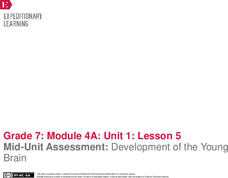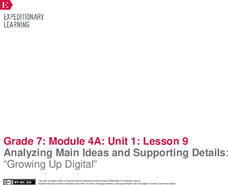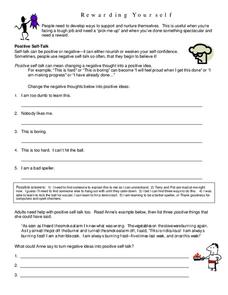American Psychological Association
Developing Adolescents
Why to young people act the way they do? Scholars investigate the stages of adolescent development incorporating high school psychology techniques. Using research from the American Psychological Association, they uncover the five areas...
EngageNY
Close Reading: Excerpt 5 of “The Digital Revolution and the Adolescent Brain Evolution”
Class members consider how technology affects social interactions as they continue reading an article about the digital revolution and adolescent brain development. Then, working in pairs, scholars answer text-dependent questions and...
Purdue University
Healthy Body Image: A Lesson Plan for Middle School Students
This is a very valuable lesson for middle schoolers on the importance of maintaining a healthy body image through diet, exercise, and positive mentality. The resource includes four lesson plans. The first two plans outline the physical...
EngageNY
End of Unit 2 Assessment, Parts 1A and 1B: Fishbowl on Screen Time and Adolescents
Here's a surefire way to ensure that class discussions go swimmingly! Using the resource, scholars participate in a Fishbowl activity, forming two concentric circles in the classroom. As the group on the inside of the fishbowl discusses...
Curated OER
Child Nutrition Unit
How much fun can you have teaching adolescents about nutrition? Try taking them to work with preschoolers for an hour! This 4-day mini-unit about the importance of nutrition early in life culminates with a field trip. It was written for...
Idaho Coalition
Teen Relationships
Collaborative activities teach adolescents to talk comfortably about teen issues. Class members identify eight factors of healthy relationships among friends, family, and boyfriends/girlfriends. These factors are then used to help...
Media Smarts
Tobacco Labels
Adolescents compare and assess the efficacy of tobacco product health warning labels from around the world. In groups, they invent warnings and create labels that would be effective for teens and children. Discussion covers advertising...
IRISS
Exploring Self-Esteem 1: What Is Self-Esteem?
Adolescents explore self-esteem and the various factors that influence a person's sense of self in this four-part lesson series. Through a combination of whole class instruction, small group discussions, and independent work, students...
King County
Reproductive System
It's every health and science teacher's favorite subject to cover: the reproductive system. This comprehensive lesson introduces adolescents to the reproductive anatomy of men and women with the help of a series of diagrams, discussions,...
Childnet International
Self Esteem
To middle schoolers, there's nothing worse than being excluded from a peer group. Developing important self-esteem skills can not only get them through awkward adolescent times, it can carry them through the rest of their lives as...
EngageNY
Mid-Unit Assessment: Development of the Young Brain
Scholars view a video clip about adolescent brain development and work with partners to identify the main idea and supporting details. Next, as part of the mid-unit assessment, pupils watch another clip from the video and complete a main...
EngageNY
Analyzing Main Ideas and Supporting Details: “Growing Up Digital”
Young scholars continue their exploration of adolescent brain development by reading an informational text, "Growing Up Digital," by Matt Richtel. Then, with partners, they complete note-catcher worksheets to capture the article's main...
EngageNY
Forming a Research-Based Claim: Introducing Stakeholders and Consequences
Consequences, consequences. Using the resource, scholars engage in a class discussion about the repercussions of too much screen time. Next, they create a Cascading Consequences chart that lists the positive and negative effects of...
EngageNY
Forming a Research-Based Claim: Analyzing Risks and Benefits for Stakeholder
Welcome to the World Café, where lively debate is on the menu! Scholars participate in the World Café protocol, moving between discussion groups to decide if the American Academy of Pediatrics should increase its adolescent screen time...
Penguin Books
A Teacher's Guide to the Signet Classic Edition of William Shakespeare's A Midsummer Night's Dream
A night in the forest, a fairy king and queen, adolescent rebellion, magic potions, love triangles, a funny play about a tragedy, a plot that, rather than running smooth, runs amok? Of course, 'Twould be a guide for teaching...
Media Smarts
Gender Messages in Alcohol Advertising
Make your students critical consumers of media, and foster an awareness of how culture is reflected and shaped by media. This resource covers how alcohol advertising presents and promotes gender stereotypes. After a discussion on...
Curated OER
Jelly Bracelets: Fashion or Sex Game?
Ever-changing fashion fads are the ideal context for an engaging sociology experiment for adolescents. Through research and conducting a survey, learners draw conclusions about the controversial jelly bracelets fad, banned in some...
Do2Learn
Sharing Space
Interacting with peers can be difficult for many children and adults with autism spectrum disorder. Guide them through a collaborative activity, during which class members come up with self-care solutions to a scenario in which they must...
Do2Learn
Responding to Questions
Why is it important to answer a question? Assist learners with their growing communication skills with an information sheet that explains how questions are meant to gather information.
HealthTeacher
Get More Sleep
Help learners identify habits that interfere with sleep and to understand the importance of adequate rest and its impact on not only physical health, but also emotional wellbeing.
Utah Education Network (UEN)
Self-Concept: Self-Esteem
Most teenagers struggle with self-image and self-esteem. Guide them through these stormy waters with a series of activities focused on positive messages, true friendship and support, and self-concept.
University of Washington
Rewarding Yourself
Everyone experiences negative self-talk from time to time, but how can youngsters learn to take it easy on themselves? Use an activity that focuses on talking positively to oneself, including giving yourself compliments and spending time...
Do2Learn
Respecting the Ideas of Others
Communicating clearly is one part of a successful conversation, but listening to others is just as important. Individuals with special needs plan calm responses and reactions to differing opinions with a collaborative activity.
Curated OER
Magazine Production
Analyze magazines as a class, looking carefully for the target audience, advertisements, and topics presented. Small groups then work as a publication team and receive a magazine that they have to "sell." Each individual has a different...
Other popular searches
- Adolescence and Puberty
- Psychology Adolescence
- Adolescence Ppt
- Adolescence Issues
- Adolescence Identity
- Adolescence in Society
- Adolescence and Adulthood
- Adolescence to Adulthood
- Adolescence & Adulthood
- Teaching About Adolescence
- Adolescence Pot
- Adolescence and Sociology

























